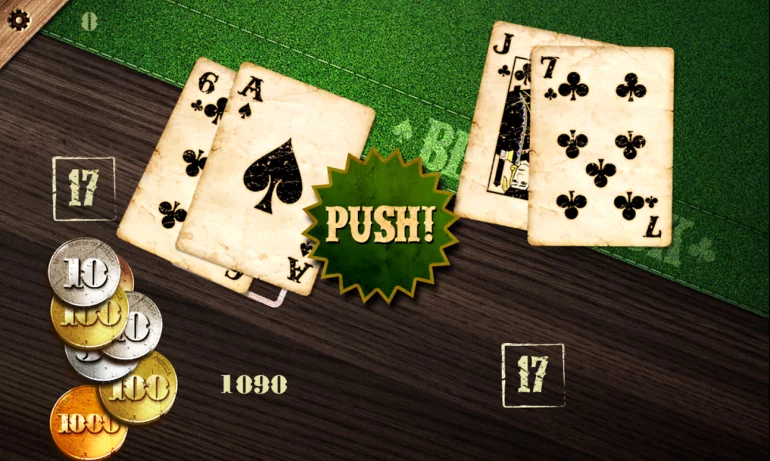In various Casinoz articles, we said you should follow the basic strategy to achieve the best results in blackjack. However, not all players do it, not realizing its meaning, so they try to understand all the nuances of the game to act consciously rather than mechanically. Specifically for blackjack fans, we analyze various aspects of blackjack in detail.

This article will discuss the player's seventeen points with one or more aces. As you might know, such a hand is called the "soft" seventeen.
The basic strategy recommends players to hit soft 17 in any situation. In some cases, it is necessary to double down).
Still, not all of them do it, assuming the probability of winning is higher if they do not take more cards for this hand. Let's use statistical data to understand why you should not dwell on the soft seventeen.
Dealing with Soft 17 in Blackjack
Seventeen points is a pretty weak hand. You can easily understand it if you study the table showing the probability of the dealer having certain hands, regardless of the face-up card.
| Dealer's Hand | Odds of Getting |
| Natural blackjack |
4.82%
|
| 21 |
7.36%
|
| 20 |
17.58%
|
| 19 |
13.48%
|
| 18 |
13.81%
|
| 17 |
14.58%
|
| Busting |
28.37%
|
After analyzing this table, we can conclude that a player who always stands on seventeen will win slightly more often than once in four rounds (28.37% in the hands when the dealer busts). Even if we add 14.58% of the cases when the dealer also has seventeen, a player still will lose more often. Standing with hard and soft seventeen increases the house edge several times.
Some Blackjack Odds
Of course, hitting hard seventeen is pointless. Using simple calculations, you can find out that in this case, only four cards (Ace, two, three, or four) can strengthen the player's hand, and the remaining nine cards (from five to king) will lead to busting. This means that the odds of busting after hitting hard seventeen are nearly seventy percent, and making the hand stronger is only thirty percent.
The case of soft seventeen is not so definite. An ace can give the player one or eleven points. Thus, tens, jacks, queens, and kings are not dangerous because the player will remain with the same seventeen points if they come out of the deck. In other words, the odds do not worsen or improve the situation with other cards on soft seventeen from eight of the thirteen (about 61.5%).
The remaining 38.5% are when the player hits on "soft" seventeen and gets a card of twelve to sixteen points. If the player stands, the chances of winning are the same as with seventeen points because he still hopes for too much from the dealer. Even if the basic strategy requires the player to continue after getting these cards, he still has an excellent chance to strengthen his hand.
| Name | Soft | RTP | ||
|
|
99.92% | |||
|
|
99.91% | |||
|
|
99.87% | |||
|
|
99.78% | |||
|
|
99.71% | |||
|
|
99.7% | |||
|
|
99.69% | |||
|
|
99.65% | |||
|
|
99.63% | |||
|
|
99.63% |
More Blackjack Odds
The table below displays the chances of getting different points if you hit soft seventeen, using the basic strategy.
- 17 points - 34.2%
- 18 points - 11.4%
- 19 points - 11.1%
- 20 points - 11.1%
- 21 points - 11.1%
- Bust - 21.1%
Remember these numbers.
Conclusion
It turns out that a player who decides to continue hitting might bust (21.1%), but the chance to improve the hand is much higher (44.7%).
As you can see, the basic strategy recommends hitting on "soft 17" because mathematical calculations show that this tactic benefits a player.




































